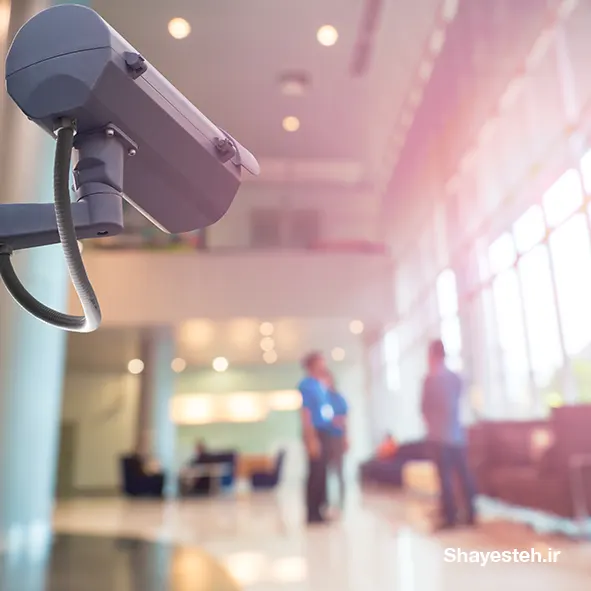در صورتی که اشکالی در ترجمه می بینید می توانید از طریق شماره زیر در واتساپ نظرات خود را برای ما بفرستید
09331464034What is workplace monitoring?
نظارت بر محل کار چیست؟

Employers have the right to monitor your <strong>activities</strong> in many situations at work.
کارفرمایان حق نظارت بر <strong>فعالیت</strong> های شما را در بسیاری از موقعیت ها در محل کار دارند.
For example, your activities may be recorded on CCTV cameras, and your letters may be opened and read. In addition, your <strong>employer</strong> may use an automated software programme to check the emails you receive at work.
به عنوان مثال، ممکن است فعالیت های شما در دوربین های مدار بسته ثبت شود و نامه های شما باز و خوانده شود. علاوه بر این، <strong>کارفرمای</strong> شما ممکن است از یک برنامه نرم افزاری خودکار برای بررسی ایمیل هایی که در محل کار دریافت می کنید، استفاده کند.
Phone calls may be listened to and <strong>recorded</strong>, and the log of websites you use may be checked.
تماسهای تلفنی ممکن است گوش داده و <strong>ضبط شوند</strong> و گزارش وبسایتهایی که استفاده میکنید، بررسی شود.
All of these forms of monitoring are <strong>covered</strong> by data protection law.
همه این اشکال نظارت، <strong>تحت پوشش</strong> قانون حفاظت از داده ها هستند.
Data protection law doesn’t prevent <strong>monitoring</strong> in the workplace.
قانون حفاظت از داده ها مانع از <strong>نظارت</strong> در محل کار نمی شود.
However, it does set down <strong>rules</strong> about the circumstances and the way in which monitoring should be carried out.
با این حال، <strong>قوانینی</strong> را در مورد شرایط و روشی که نظارت باید انجام شود، تعیین می کند.
Before deciding whether to introduce monitoring, your employer should identify any negative effects the monitoring may have on staff. This is called <strong>impact</strong> assessment.
قبل از تصمیم گیری برای اجرای نظارت، کارفرمای شما باید هر گونه اثرات منفی که نظارت ممکن است بر کارکنان داشته باشد را شناسایی کند که ارزیابی <strong>تاثیر</strong> نامیده می شود.
Monitoring electronic <strong>communications</strong> at work
نظارت بر <strong>ارتباطات</strong> الکترونیکی در محل کار
Your employer can legally monitor your use of electronic communications in the workplace if the monitoring relates to the business and the equipment being monitored is provided partly or wholly for work.
اگر نظارت مربوط به کسب و کار باشد و تجهیزات تحت نظارت به طور کامل یا جزئی برای کار ارائه شده باشد، کارفرمای شما می تواند به طور قانونی بر استفاده شما از ارتباطات الکترونیکی در محل کار نظارت کند.
Except in extremely limited circumstances, employers must take <strong>reasonable</strong> steps to let staff know that monitoring is happening, what is being monitored and why it is necessary.
به جز در شرایط بسیار محدود، کارفرمایان باید اقدامات <strong>معقولی</strong> را انجام دهند تا به کارکنان اطلاع دهند که چه نوع نظارتی در حال اجرا است، بر چه چیزی نظارت می شود و چرا این کار لازم است.
As long as your employer <strong>sticks</strong> to these rules, they don’t need to get your consent before they monitor your electronic communications, but only if the monitoring is for specific reasons.
تا زمانی که کارفرمای شما به این قوانین <strong>پایبند باشد</strong>، قبل از نظارت بر ارتباطات الکترونیکی تان نیازی به دریافت رضایت شما ندارد، اما فقط در صورتی که نظارت به دلایل خاصی باشد.
These may be to establish facts which are relevant to the business or to check standards, for example, listening in to phone calls to assess the <strong>quality</strong> of your work.
اینها ممکن است برای بررسی حقایقی مرتبط با کسب و کار یا بررسی استانداردها باشد، به عنوان مثال، گوش دادن به تماس های تلفنی برای ارزیابی <strong>کیفیت</strong> کار شما.
Monitoring is also allowed if its purpose is to prevent or <strong>detect</strong> crime.
نظارت نیز در صورتی مجاز است که هدف آن پیشگیری یا <strong>کشف</strong> جرم باشد.
It may be necessary to make sure electronic systems are operating <strong>effectively</strong>, for example, to prevent computer viruses entering the system.
ممکن است لازم باشد از عملکرد <strong>مؤثر</strong> سیستم های الکترونیکی اطمینان حاصل شود، به عنوان مثال، برای جلوگیری از ورود ویروس های رایانه ای به سیستم.
Your employer is also allowed to listen in to any calls you make to <strong>confidential</strong> helplines, but in this case, he or she is not allowed to record these calls.
کارفرمای شما همچنین مجاز است به هر تماسی که با خطوط کمکی <strong>محرمانه</strong> می گیرید، گوش دهد، اما در این حالت، اجازه ضبط این تماسها را ندارد.
Questions & answers
Questions 15-21
Complete the notes below.
Choose NO MORE THAN TWO WORDS from the text for each answer.
Write your answers in boxes 15-21 on your answer sheet.
Guide to employees on workplace monitoring
Your employer may monitor you at work by checking
- recordings of your activities
- your letters and (15) …………………..
- your phone calls and which websites you have visited
Rules for monitoring are established by data protection law. This states that employers must carry out a procedure that is known as (16) ………………….. before introducing monitoring,
In general, monitoring is legal if
- it relates to the business
- you are using (17) ………………….. intended for work
- the worker has been informed
Monitoring may be used
- to evaluate the (18) ………………….. of your work
- for stoping the find out about (19) …………………..
- to stop the possibility of (20) ………………….. affecting systems
- for checking calls to (21) ………………….. (these cannot be recorded)
نظرات کاربران
هنوز نظری درج نشده است!